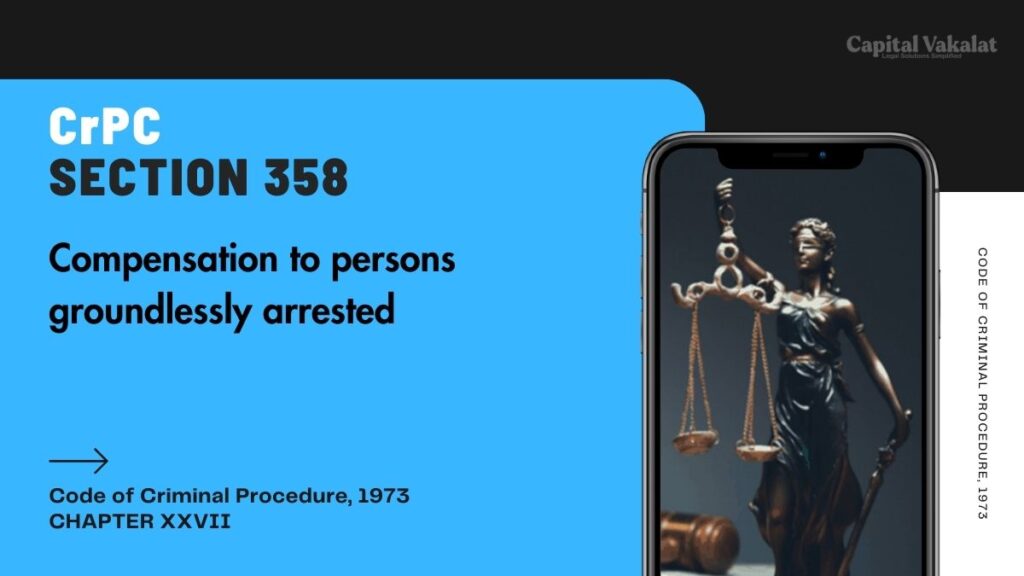The criminal justice system in India, like in many other jurisdictions, strives to balance the enforcement of law with the protection of individual rights. One critical provision ensuring this balance is Section 358 of the Code of Criminal Procedure (CrPC), which addresses compensation for individuals who are groundlessly arrested.

This article delves into the intricacies of Section 358 CrPC, exploring its implications, the process involved, and its significance in safeguarding citizens’ rights.
Historical Context and Legal Evolution of Section 358 CrPC
The provision for compensation under Section 358 CrPC has its roots in the British colonial legal system. The necessity for such a provision arose from the widespread misuse of power by law enforcement agencies, leading to unwarranted arrests and detention of individuals without just cause. Over time, this section has been refined to ensure it meets contemporary legal standards and effectively protects individuals from wrongful arrests.
Key Provisions of Section 358 CrPC
Section 358 CrPC stipulates that any person who is groundlessly arrested must be compensated. The amount of compensation is determined by the magistrate and is to be paid by the arresting officer. The intent is to provide a remedy for the aggrieved person and to act as a deterrent against arbitrary use of arrest powers by law enforcement.
Eligibility Criteria for Compensation under Section 358 CrPC
To be eligible for compensation under this section, the following criteria must be met:
- The arrest must be groundless, meaning there was no reasonable cause or legal justification.
- The person must have been arrested by a police officer without a warrant.
- A magistrate must confirm that the arrest was indeed groundless.
The Process of Claiming Compensation
The process begins when an individual believes they have been wrongfully arrested. They can file a complaint with the magistrate, who will then examine the circumstances of the arrest. If the magistrate finds the arrest was groundless, they will order the police officer responsible to pay compensation. This process underscores the importance of judicial oversight in protecting individual freedoms.
Impact of Section 358 CrPC on Law Enforcement Practices
Section 358 CrPC has a significant impact on the conduct of law enforcement agencies. By holding police officers accountable for wrongful arrests, it promotes a culture of responsibility and caution in the exercise of arrest powers. This provision serves as a crucial check against the misuse of authority and helps maintain public trust in the criminal justice system.
Challenges and Criticisms
Despite its importance, Section 358 CrPC faces several challenges. One major issue is the reluctance of victims to come forward due to fear of retribution or lack of awareness about their rights. Additionally, the process of claiming compensation can be lengthy and cumbersome, discouraging many from seeking justice. Critics also argue that the compensation amounts are often insufficient to truly compensate for the harm suffered.
Case Studies Highlighting the Application of Section 358 CrPC
To understand the real-world application of Section 358 CrPC, it is useful to examine notable cases where individuals were compensated for wrongful arrests. These cases highlight both the strengths and limitations of the provision, offering valuable insights into its practical implications.
Reforming Section 358 CrPC: Recommendations for Improvement
To enhance the effectiveness of Section 358 CrPC, several reforms can be considered:
- Increasing public awareness about the provision and the rights it confers.
- Simplifying the process of claiming compensation to make it more accessible.
- Revising compensation amounts to ensure they are commensurate with the harm suffered.
- Strengthening oversight mechanisms to ensure accountability of law enforcement officers.
Conclusion
Section 358 CrPC plays a vital role in protecting individuals from groundless arrests and ensuring accountability within the law enforcement system. While there are challenges to its implementation, with appropriate reforms and increased awareness, it can serve as a robust safeguard against the misuse of arrest powers. Ensuring justice and protecting individual rights must remain at the forefront of any legal framework, and Section 358 CrPC is a crucial component of this endeavor.